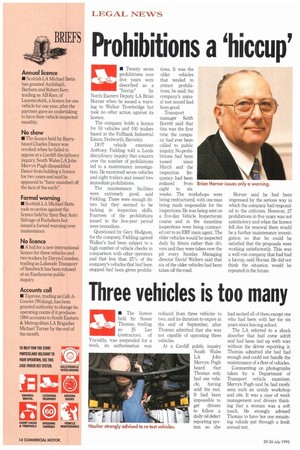Prohibitions a 'hiccup'
Page 16

If you've noticed an error in this article please click here to report it so we can fix it.
• Twenty seven prohibitions over five years were described as a "hiccup" by North Eastern Deputy LA Brian Horner when he issued a warning to Walker Trowbridge but took no other action against its licence.
The company holds a licence for 50 vehicles and 100 trailers based at the Fa!lbank Industrial Estate, Dodworth, Barnsley.
DOT vehicle examiner Anthony Fielding told a Leeds disciplinary inquiry that concern over the number of prohibitions led to a maintenance investigation. He examined seven vehicles and eight trailers and issued two immediate prohibitions.
The maintenance facilities were extremely good, said Fielding. There were enough fitters but they seemed to be lacking in inspection skills. Fourteen of the prohibitions issued in the five-year period were immediate.
Questioned by Gary Hodgson, for the company, Fielding agreed Walker's had been subject to a high number of vehicle checks in comparison with other operators and that less than 25% of the company's vehicles that had been stopped had been given prohibi tions. It was the older vehicles that tended to attract prohibitions, he said; the company's annual test record had been good.
Transport manager Keith Borritt said that this was the first time the company had ever been called to public inquiry No prohibitions had been issued since March and the inspection frequency had been reduced from eight to six weeks. The workshops were being restructured, with one man being made responsible for the inspections. He was being sent on a five-day Vehicle Inspectorate course and in the meantime inspections were being contracted out to an ERF main agent. The older vehicles would be inspected daily by fitters rather than drivers and they were taken over the pit every Sunday. Managing director David Walters said that six of the older vehicles had been taken off the road. Horner said he had been impressed by the serious way in which the company had responded to the criticism. However, 27 prohibitions in five years was not satisfactory and when the licence fell due for renewal there would be a further maintenance investigation so that he could be satisfied that the proposals were working satisfactorily. This was a well run company that had had a hiccup, said Horner. He did not think the situation would be repeated in the future.




























































































